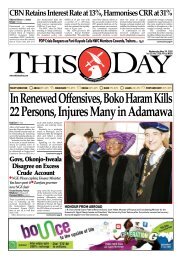You also want an ePaper? Increase the reach of your titles
YUMPU automatically turns print PDFs into web optimized ePapers that Google loves.
THISDAY • MONDAY, MAY 18, 2015<br />
23<br />
PERSPECTIVE<br />
The Next Steps for the Niger Delta<br />
Tonbofa Ashimi sets an agenda for the Niger Delta in the emerging<br />
dispensation<br />
Many Nigerians believe that<br />
the cry from the Niger Delta<br />
should be muted since the<br />
Niger Delta was given the<br />
chance to rule Nigeria. They are right to<br />
the extent that the Niger Delta indigenes<br />
should now be first partakers in investing<br />
in developing the region. But they must<br />
understand that the cry is even louder<br />
now than before and must be dealt with<br />
by Nigeria wholly.<br />
The cry is from the little children<br />
that innocently bathe in oil blackened<br />
pools of water that surround their small<br />
islands. Their parents fish from these<br />
waters ignorant of the health hazards this<br />
exposure brings to them. Environmental<br />
pollution has risen with the activities of<br />
illegal oil refineries in the creeks, added<br />
to those of the operators of OMLs. The<br />
urgency for justice in the Niger Delta has<br />
increased.<br />
The battle for justice started formally<br />
with the Movement of the Survival of the<br />
Ogoni People (MOSOP) and then came<br />
the Kaima Declaration, which encouraged<br />
non-violent fighting for environmental<br />
rights of the Niger Delta, some measure<br />
of control over the oil resources, as well<br />
as general recognition as a vital minority<br />
Nigerian tribe.<br />
This was the cause for which the likes<br />
of the late Ken Saro Wiwa and Oronto<br />
Douglas fought. With the execution of<br />
Saro Wiwa and the deepening of poverty<br />
levels in the region whilst oil boomed,<br />
some youth members decided to pick up<br />
guns and force the recognition sought.<br />
They ruled over the creeks, which<br />
holds most of the oil in their black green,<br />
waters and prevented the oil operators<br />
from exploiting the oil. They kidnapped<br />
expatriates, enriched themselves from<br />
ransom paid whilst impoverishing<br />
Nigeria. They succeeded where talks<br />
failed, since the federal government<br />
of Nigeria’s dwindling revenue forced<br />
dialogue, culminating in amnesty being<br />
given to the militants.<br />
Then came the intervention of destiny<br />
and the inauguration of President Goodluck<br />
Jonathan (then Vice President of the<br />
FRN) as President upon the demise of<br />
the then President Musa Yar’Adua. This<br />
was certainly more recognition than the<br />
Minister Of Defence, Maj-Gen. Godwin Abbe, Ex-Militant Leader, Government Ekpuomokpolo (Tompolo), Governor Emmanuel Uduaghan And Timi Alaibe<br />
initial fighters foresaw.<br />
This was the chance to right the<br />
environmental injustices – change the<br />
attitude to oil spillages by ensuring<br />
compensation, huge fines and thorough<br />
clean up; ensure adequate community<br />
participation in the OMLs; start training<br />
programmes for the youth in relevant<br />
skills in the energy sector. Five years<br />
down the line and the creeks are more<br />
blackened with oil, environmental laws<br />
still archaic with negligible penalties and<br />
regulators of the oil sector still in bed<br />
with operators. The youth in the creeks<br />
are still disillusioned; the “cause” seemed<br />
to have been forgotten.<br />
Nigerians opted for change in the<br />
2015 elections and the door was shut.<br />
President Goodluck Jonathan saved the<br />
country of the anticipated anarchy by<br />
conceding to defeat, ever so graciously,<br />
even as the Orubebes started frothing.<br />
Niger Deltans, it’s time to return to the<br />
drawing board and understand what the<br />
cause was about!<br />
It was about saving the future of our<br />
children. It was about bringing fresh<br />
fish, prawns back to the waterside. It was<br />
about ensuring corporate responsibility<br />
of international standard that global oil<br />
operators adhere to in developed worlds<br />
that the likes of President Obama impose<br />
huge fines to ensure. It was about<br />
encouraging our youths to work, learn<br />
the skills to be relevant in the energy<br />
sector.<br />
As the “resource control hats” that<br />
benefitted from the FCT vacate the<br />
centre, they should head back to the<br />
Niger Delta. They should invest in good<br />
private schools, in businesses that will<br />
create employment, generally start to put<br />
the money earned where our mouths<br />
have been and take the first steps to<br />
developing the region.<br />
We also call on the new government to<br />
make the laws stricter to discourage pollution<br />
and generally adopt an approach<br />
of aggressive enforcement against oil and<br />
gas pollution, to fight illegal refineries, to<br />
involve communities in oil mining leases.<br />
This is the change we look forward to in<br />
the Niger Delta. This is the next step for<br />
the Niger Delta.<br />
-Tonbofa is Managing Partner, Edward<br />
Ekiyor and Co. She was also the Director<br />
General, Due Process and e-Governance for<br />
Bayelsa State<br />
PLATEAU’S PEACE OF THE GRAVEYARD<br />
statesmen from all the various tribes and<br />
groups in the state, to put heads together<br />
to ensure that peace is given a chance.<br />
On his part, Buhari, though a Fulani is<br />
expected to ensure that justice is done<br />
to every tribe and making sure that the<br />
unabated attacks and clashes between his<br />
Fulani kinsmen and the native Berom farmers<br />
in the state are brought to an end.<br />
There is also no gain-saying the fact that<br />
the promotion of good governance at all<br />
levels of governmental authority remains<br />
the greatest antidote to the problems of<br />
democratic sustenance. In the absence of<br />
good governance, the ruling elite recourse to<br />
ethnic, religious and regional appeals thereby<br />
inflaming primordial identities of the masses.<br />
As such, only a transparent and accountable<br />
leadership that rises above primordial<br />
considerations will be able to enhance the<br />
peaceful co-existence of autochthons and<br />
settlers in Jos.<br />
The inefficiency and ineffectiveness of<br />
security institutions in Jos generally is<br />
underscored by the scope, magnitude and<br />
persistence of violent identity conflicts in<br />
the state.<br />
Strengthening security forces capacity of<br />
proactively detecting early warning signs as<br />
well as respond to inter-communal tension<br />
can help to contain better the outbreaks of<br />
violence. This will require capacity building<br />
and efficient intelligence gathering mechanisms,<br />
including the provision of state of<br />
the art weaponry, necessary for combating<br />
unrest in the 21st century.<br />
In doing this, means for investigating<br />
allegations of security sector complicity in<br />
ethnic and religious violence are required<br />
to ensure accountability. Also, measures that<br />
prevent political elites from manipulating<br />
security personnel for parochial aggrandisement<br />
should be put in place.<br />
Much of the violence on the state has<br />
resulted largely from ignorance and illiteracy.<br />
The fact is that a substantial population of<br />
Nigerians are still illiterate, which makes them<br />
easy vessels of manipulation by unpatriotic<br />
elites. This is very much the case in Jos.<br />
It is therefore necessary to promote and<br />
encourage education by way of making it<br />
mandatory and free, especially at primary and<br />
secondary school levels, including Nomadic<br />
Education for the Fulani. This will help groom<br />
a new breed of citizens that are conscious<br />
of the implications of the manipulation of<br />
primordial identities or mutual co-existence<br />
and development. Through education, people<br />
can be exposed to the several other peaceful<br />
means for resolving conflicts, rather than<br />
resorting to violence.<br />
The fact that poverty and socio-economic<br />
Buhari...will he change anything.<br />
marginalisation often lead to aggressive and<br />
erratic behaviour with ethnic and or religious<br />
connotations cannot be over-emphasised.<br />
Members of some ethnic groups that feel<br />
alienated or deprived often rationalise their<br />
hardship as resulting from the control of<br />
politics and society by members of rival<br />
ethnic groups.<br />
This scenario has whipped up primordial<br />
sentiments which have often resulted in<br />
violent conflicts. It is therefore imperative<br />
that government and other relevant institutions<br />
design poverty reduction schemes that will<br />
be inclusive of all identities and help reduce<br />
the level and scope of poverty as well as<br />
inequality that are often the real causes of<br />
crisis in the state.<br />
Although the Jos situation has transcended<br />
a local affair, it is important that the Buhari<br />
administration takes it more serious, especially<br />
that its selling point is hinged on security.<br />
The killing and madness in Jos cannot go<br />
on unchecked because of its larger implications<br />
for the polity. It is for this reason that<br />
the presidency must take charge of the Jos<br />
situation, and making it an example of the<br />
change it has so much talked about. There<br />
is need for respite in Jos as do other parts<br />
of the country and this Buhari must take<br />
seriously without prejudice to religion and<br />
ethnicity.
















